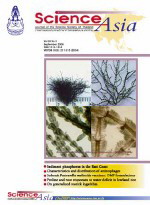ThaiScience
ThaiScience
SCIENCE ASIA
Volume 46, No. 01, Month FEBRUARY, Year 2020, Pages 30 - 36
A novel silkworm pupae carboxymethyl chitosan inhibits mouse l929 fibroblast proliferation
Lin Zhu, Zuo-Qing Fan, Xin-Qin Shi, Na Wang, Ying-Ying Bo, Hong-En Guo
Abstract Download PDF
Postoperative intestinal adhesions are common and serious complications after surgery that can cause pain and potential mortality. Our previous study confirmed that silkworm pupae carboxymethyl chitosan (SP-carboxymethyl chitosan) reduced postoperative adhesion in vivo. Here, we elucidated the inhibitory effects of SP-carboxymethyl chitosan on mouse L929 fibroblasts. Cells were exposed to SP-carboxymethyl chitosan for 72 h, then the inhibitory effects were assessed via transforming growth factor-β1 (TGF-β1)/Smads, plasminogen activator inhibitor 1 (PAI-1), and tissue-type plasminogen activator (t-PA) signaling. The results showed that SP-carboxymethyl chitosan suppressed cell hyperplasia and significantly attenuated the gene and protein expressions of the TGF-β1/Smads signaling pathways. We also confirmed that t-PA/PAI-1 greatly increased for all SP-carboxymethyl chitosan-treated groups compared to the control. These findings suggest that SP-carboxymethyl chitosan may affect L929 cell proliferation through the TGF-β1/Smads signaling pathway to prevent adhesion after an operation.
Keywords
carboxymethyl chitosan, mouse L929 fibroblasts, TGF- 1/Smad signaling pathwaySCIENCE ASIA
Published by : The Science Society of Thailand
Contributions welcome at : http://www.scienceasia.org/
